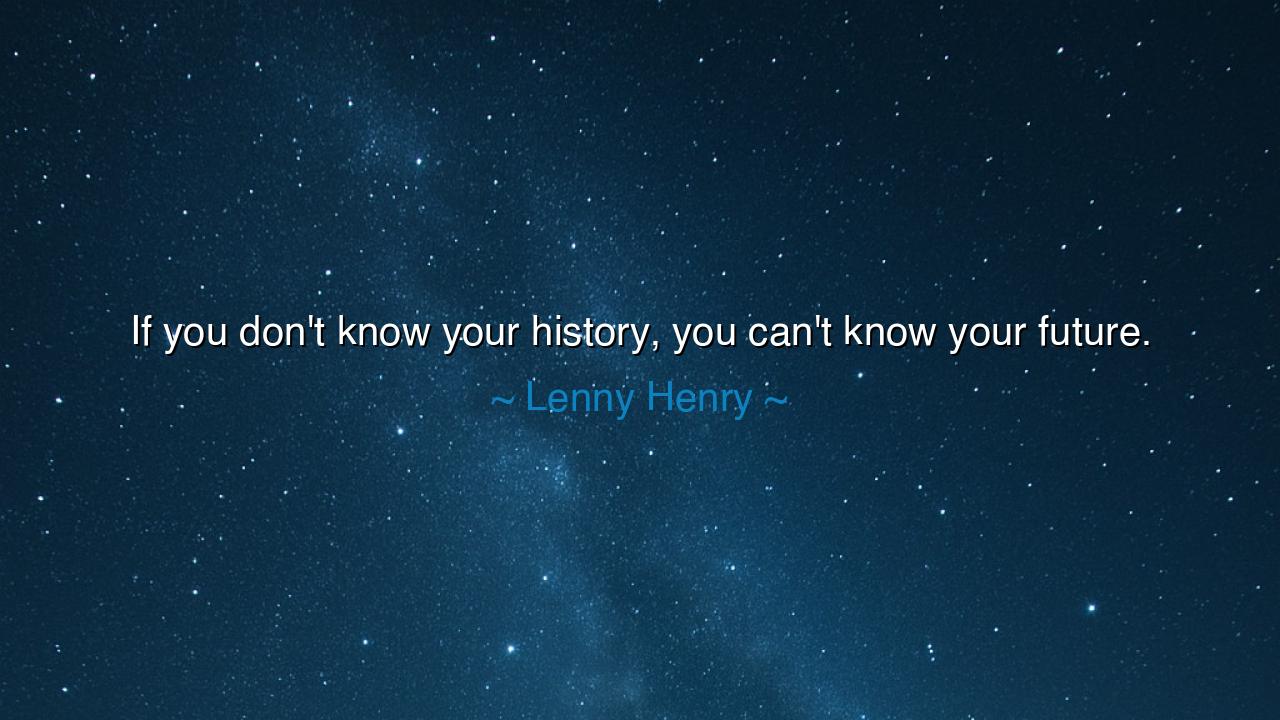
If you don't know your history, you can't know your future.






In the profound words of Lenny Henry, "If you don't know your history, you can't know your future," we are reminded of a timeless truth that transcends the ages: the past is not merely a series of events to be left behind; it is the foundation upon which the future is built. The wisdom of this statement reveals that without an understanding of where we come from—our roots, our struggles, and our achievements—we are left adrift, without a clear path forward. Just as a tree draws strength from the soil beneath it, so too must we draw from our history to nurture our future, ensuring that we move forward with both wisdom and purpose.
The ancient Greeks, who revered wisdom above all else, understood the power of history in shaping one's future. Herodotus, often called the "father of history," wrote of the events of the past not as mere stories, but as lessons for future generations. He knew that the victories and failures of those who came before us offer invaluable insights into the choices we must make in our own lives. Without such knowledge, he argued, how could one hope to navigate the complexities of the present and future? This wisdom was not lost on the Romans, whose leaders like Cicero believed that history was the key to good governance. Cicero often cautioned against the folly of ignoring the past, for it was the past that revealed the lessons we needed to guide the future.
Alexander the Great, in his conquests across the known world, did not simply act on impulse. He studied the strategies of past generals and learned from their successes and failures. His knowledge of history was not just academic; it was his guide to victory. He understood that the decisions he made would echo through time, and that without an understanding of the past, his reign would be short-lived. History, for Alexander, was not just a record of what had been; it was the key to understanding what could be. In the same way, Lenny Henry’s words remind us that without knowledge of our own history, we too risk repeating past mistakes or losing our sense of direction.
Consider the story of Mahatma Gandhi, whose movement for Indian independence was deeply rooted in the history of his people. Gandhi drew upon the ancient wisdom of non-violent resistance found in the Hindu scriptures, while also acknowledging the historical injustices that had shaped his country’s struggle. Gandhi’s vision for India’s future was intricately tied to the understanding of its past, including the exploitation under British rule and the strength of its cultural heritage. He knew that only by honoring the past, could India forge a new path to freedom. In his life, the knowledge of history was not a passive thing; it was an active force, propelling him to act with purpose and clarity.
To ignore history, as Lenny Henry points out, is to sever ourselves from the lessons that have already been learned, the wisdom that has already been gained. The past, with all its struggles, triumphs, and failures, offers us the tools to navigate our present and shape our future. Whether in the realm of politics, art, or personal growth, those who forget the past are destined to repeat its mistakes. Consider the lessons of the Great Depression, a period in history that shaped the economic policies of nations around the world. Those who studied and understood the failures of the past were better prepared to implement the reforms that would prevent another such catastrophe.
The lesson here is clear: to shape the future, we must be rooted in the knowledge of history. Understanding where we’ve been gives us the wisdom to move forward with clarity and purpose. Just as the ancients believed that history was a teacher, so too must we embrace its lessons. Lenny Henry reminds us that if we do not know where we come from, we risk wandering aimlessly in the present, without direction or understanding. History is not a burden; it is a gift, offering us guidance, clarity, and strength as we build the world of tomorrow.
In practical terms, we must commit ourselves to the study and reflection on history. Whether through books, conversations, or personal experiences, we must seek to understand the past, not as a distant memory, but as a living force that shapes who we are today. Only then can we move forward with the wisdom to create a future worth building. Just as Alexander studied his predecessors, and Gandhi drew strength from the history of his people, we must all look to the past to inform our choices, so that we might create a future rooted in knowledge and understanding.






AAdministratorAdministrator
Welcome, honored guests. Please leave a comment, we will respond soon